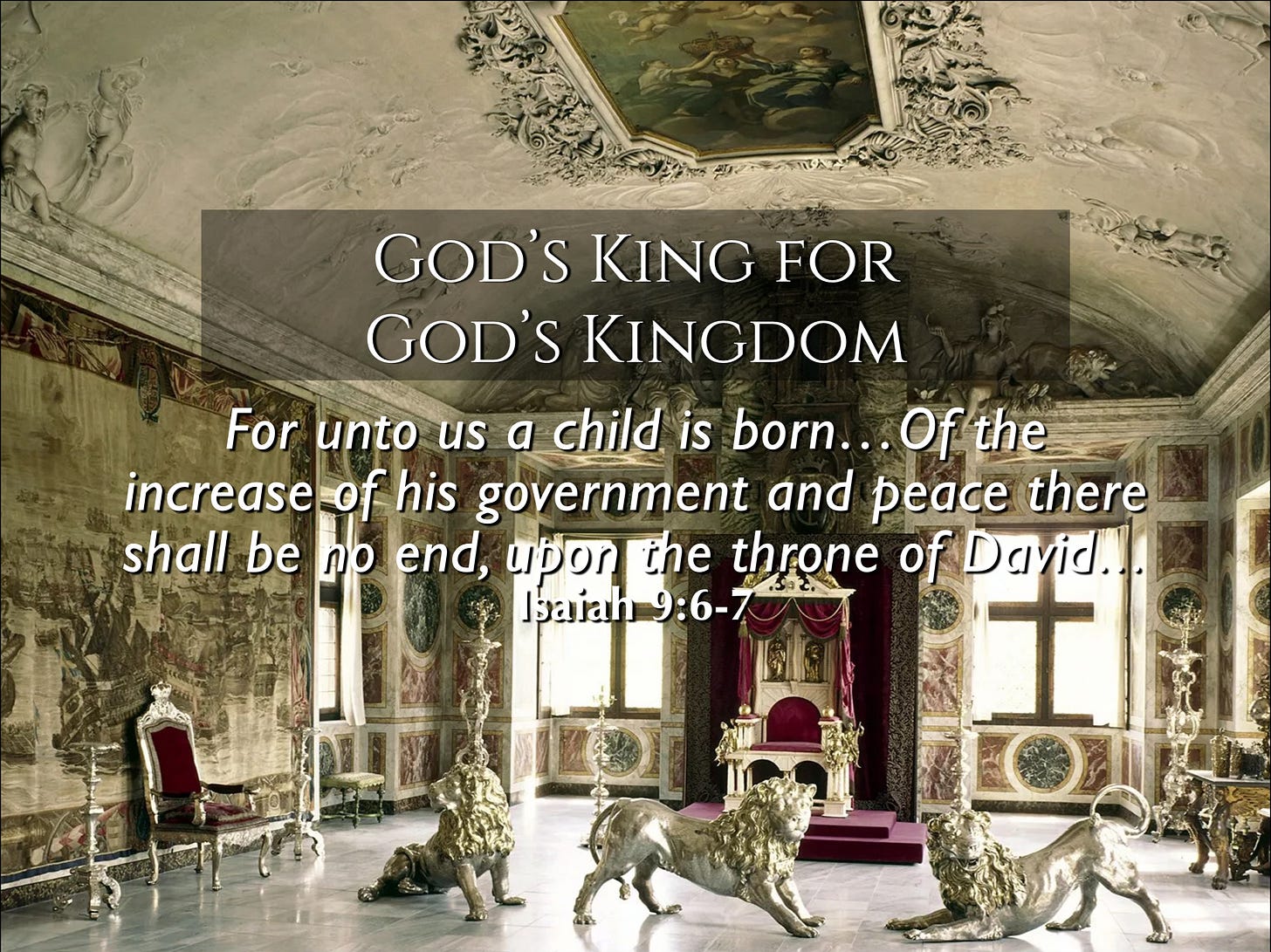Why is Jesus called the Son of God?
Jesus has numerous titles described in Scripture, such as Son of Man, High Priest, Suffering Servant, Messiah/Christ, Son of God, and more. Sometimes Christians use these terms as though they are interchangeable but that is a mistake. Although Jesus fulfilled each of these offices or positions and sometimes there is unity between certain terms, many of Jesus’ titles hold a specific and special meaning. One such title is the Son of God, what does this phrase mean? We must begin by examining the Davidic Covenant.
A covenant, in the Biblical sense, is a relationship between two parties with legally binding agreements. Covenants can be illustrated in ancient history by observing a ‘servant’ submitting to a ‘high king’ in return for protection. In the OT, we see God represented as the covenant king and Israel as His covenantal servants. ‘I will be your God and you will be My people’ is a covenant phrase that appears often. God would protect and bless His people, and they would serve and be loyal to Him. Famous covenants from Scripture include God’s covenant with Abraham (see Genesis 12-17), and the Mosaic Covenant given at Mount Sinai (see Exodus 19-20).
Unfortunately, one particular covenant is vastly overlooked. In 2 Samuel 7, David expressed his desire to build a house for God’s Name (this building is commonly called the Temple). God was pleased with David’s heart, but He did not permit David to build God’s house. Instead, God gave David promises that would impact the future of the Kingdom of Israel.
2 Samuel 7:11b Also the Lord telleth thee that he will make thee an house.
2 Samuel 7:12 And when thy days be fulfilled, and thou shalt sleep with thy fathers, I will set up thy seed after thee, which shall proceed out of thy bowels, and I will establish his kingdom.
2 Samuel 7:13 He shall build an house for my name, and I will stablish the throne of his kingdom for ever.
2 Samuel 7:14a I will be his father, and he shall be my son.
These promises included,
David would have a son, and he would become king: this is important because God was promising David a royal house (dynasty). Saul was not given this type of promise, but David was given a guarantee that his lineage would rule.
David’s son would build the house for God’s Name. This temple would ultimately fulfill Deuteronomy 12:5-6.
David’s son would rule forever. Up to this point, no king in Israel had a son to rule all Israel, much less rule forever.
God told David, the king would not merely be the Son of David, but he would be God’s Son too.
The Davidic Covenant answers why Jesus is called the Son of David and the Son of God. Jesus is the Son of David by blood and the declared the Son of God by covenant anointing (Romans 1:3-4). The phrases Son of David and Son of God strike at the heart of Biblical theology: the kingship of Jesus.
It was through covenant commission and anointing that a king (from David’s line) was called God’s son. This can be seen in Psalms 2 and 89 (see Psalm 89:20-29).
Psalm 2:6-7 Yet have I set my king upon my holy hill of Zion. I will declare the decree: the LORD hath said unto me, Thou art my Son; this day have I begotten thee.
Some scholars label this psalm as a coronation psalm, meaning, it was recited at the crowning of a new king. This is appropriate given that Jesus heard these words at His baptism (His coronation!)
To state it as clearly as possible, Jesus was called the Son of God because He fulfilled the Davidic Covenant. Jesus was/is the King from David’s line.
Psalms and Isaiah 11 speak of the King being anointed by God. The King was to be empowered by God to rule: He was God’s King for God’s Kingdom (read all of Psalm 2 and Isaiah 11).
The King’s anointing is where we get the terms Messiah (Hebrew) and Christ (Greek). Both of these terms mean ‘the anointed one.’ Another example of why Christ’s baptism is significant because that is where the King was anointed (see my article on Jesus’ baptism here)
Therefore, Messiah, Christ, Son of David, and Son of God are all kingly phrases and are all connected to the Davidic Covenant. In Jesus’ day, the Christ was to come and destroy God’s enemies and re-establish David’s kingdom, which would usher in a new age.
Look at these NT passages,
Matthew 16:16 And Simon Peter answered and said, Thou art the Christ, the Son of the living God.
Mark 1:1 The beginning of the gospel of Jesus Christ, the Son of God;
Luke 4:41 And devils also came out of many, crying out, and saying, Thou art Christ the Son of God. And he rebuking them suffered them not to speak: for they knew that he was Christ.
John 1:49 Nathanael answered and saith unto him, Rabbi, thou art the Son of God; thou art the King of Israel.
John 20:31 But these are written, that ye might believe that Jesus is the Christ, the Son of God; and that believing ye might have life through his name.
Also, observe Matthew 11, where John desired to know if Jesus was the Christ, and Jesus responded by quoting Isaiah. Isaiah spoke of the Messianic king more than any other OT book. The prophet wrote throughout the Book that when God began to work that the dead would be raised, and, specifically in Isaiah 35 that,
35:5 Then the eyes of the blind shall be opened, and the ears of the deaf shall be unstopped.
35:6 Then shall the lame man leap as an hart, and the tongue of the dumb sing: for in the wilderness shall waters break out, and streams in the desert.
These miracles would be evidence that God’s new kingdom was beginning, and Jesus cited this passage to show that the kingdom was truly here. Blind Bartimaeus realized Jesus’ identity and cried out, “Jesus, thou Son of David, have mercy on me” because he wished to regain his vision, which Jesus granted—because He was the anointed King to reverse the effects of the Fall (sin, disease, death).
Ezekiel 36-37 are also wonderful Messianic passages, but these two chapters are primarily focused on for their prophecies regarding Pentecost. However, Ezekiel 37 ends with God promising that He will reunite the split kingdoms of Israel and Judah, and that David would rule a united Israel again. Of course, the restoration of David’s throne and kingdom are in reference to the Davidic Covenant. Therefore, God will send His Spirit upon His people, establish a new kingdom, and set His Messiah on the throne.
Upon Jesus’ Second Coming, He will completely fulfill the Davidic Covenant and will be set down on David’s throne in Jerusalem and rule the entire earth for 1000 years. This is called the Millennium (Psalm 2, Isaiah 11, & Revelation 20), and will take place directly before eternity begins.
In conclusion, I hope this was not too much of a shotgun approach, but the central passage to understand is 2 Samuel 7. We know that Jesus was God in the flesh (1 Timothy 3:16) and we run the aisles to that fact, but do we also run the aisles when the topic of His humanity (sacrifice, servanthood, kingship) comes up?
If we take the Texts of 2 Samuel 7 and Psalm 2 seriously, then it is clear that the Messiah would be called God’s Son. Viewing the Bible through the lens of the Davidic Covenant will help us understand Jesus’ identity and His mission more clearly.
Furthermore, Matthew 28:19 makes more sense in this light, as it is a faith statement of believing in,
A) the Father (God of the OT)
B) the Son (the coming Christ-King)
C) the Spirit (the promise of the Father to transform His people-Ezekiel 36-37)
And the one name that unifies all three of these OT beliefs is Jesus (Acts 4:12).
Because of the doctrine of the Trinity, the phrase Son of God is often identified as a term for Jesus’ divinity. However, Scripture reveals the title’s primary emphasis is on His kingship, not deity. Jesus will return, He will sit on David’s throne, and He will rule forever (cf. Isaiah 9:6-7). I challenge you to do a study and observe how many times Christ’s kingship is celebrated in Scripture. It is only His rule that will return Creation back to what God originally intended it to be: in harmony and relationship with the Creator.



